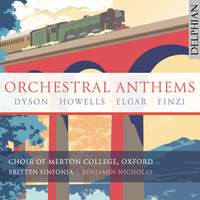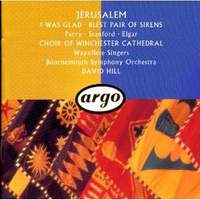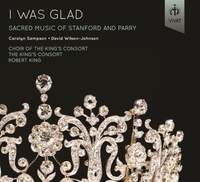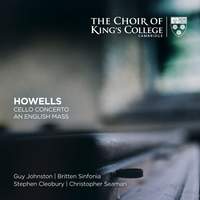Interview,
Benjamin Nicholas on Orchestrated Anthems

At cathedrals up and down the country, choir term – mirroring school term – has either just ended, or is just about to. The other week, the normally humorous and offbeat website Quires & Places (riffing on a rubric from the Book of Common Prayer) published a sincere and deeply-felt blog post that captured the emotions of seeing "graduating" choristers, both children and adults, move on to other things and other stages of life.
Given this valedictory element, the final services of term generally feature big, crowd- and choir-pleasing favourites in order to go out with a bang. Often Parry's glorious Blest Pair of Sirens or Bairstow's thrilling Blessed City takes pride of place; at Birmingham a few weeks ago it was Wesley's noble Ascribe unto the Lord.
The timing of the latest release from the choir of Merton College, Oxford, comprising richly orchestrated versions of some of these end-of-term extravaganzas and aided and abetted by the Britten Sinfonia in bringing them to life, thus could hardly be better. From a striking incarnation of Blessed City for strings and piano to a luxuriously Wagnerian – yet never stodgy – orchestration of Dyson's ever-popular evening canticles in D, it's a true celebration of big-boned church repertoire as it's rarely been heard before.
I spoke to the Director of Merton College Choir, Benjamin Nicholas, about the works on this album, how these versions came to be, and how long we might have to wait for more...
Orchestral recordings of some sacred choral favourites have been around for a while - all four of Stanford’s best-known canticle settings, for instance, on a recording on Vivat from 2013. Where did the idea for this particular project first come from?
I remember David Hill’s fabulous recordings with the Bournemouth Symphony of Elgar, Stanford, Hadley, Parry, Walton etc being released on Argo in the early 1990s, and since then I have been curious about orchestrations of this mainstream Anglican choral repertoire. Reading Wulstan Atkins’ The Elgar-Atkins Friendship about ten years ago made me determined to find Elgar’s orchestrations of Purcell, Batishall and Wesley. Sadly, only the Purcell (Jehova) has survived. I’ve had this programme in my head for the last few years, and was able to bring it to fruition thanks to a generous donation from a supporter of Merton College Choir.
What sort of occasions would these orchestrations have originally been used for, and who actually made them - composers, adoring after-comers, or a bit of both?
The answer is huge choral gatherings – from a Coronation to our most famous music festivals! It’s no surprise that the Three Choirs Festival is responsible for two of these orchestrations: Elgar’s take on Purcell’s Jehova was completed for the 1929 festival, and Finzi arranged his Lo, the full for the 1947 festival, the premiere having been given (on the church’s fine Romantic organ) at St Matthew’s Church, Northampton the previous year. The inclusion of the Dyson Canticles serves as a reminder that the oldest choral festival in the world, the Festival of the Sons of the Clergy (established 1655), has been the inspiration for many works for choir and orchestration. Elgar, Parry and Stanford all wrote for the Festival, and a former Sub-Organist of St Paul’s orchestrated Dyson’s Evening Service in D for the 1935 Festival.
Do you anticipate them re-entering the repertoire today, as occasional showpieces for choirs inclined to splash out?
To be honest, I’m not sure. The orchestrations, with the exception of Bairstow’s Blessed City and Elgar’s miniature Ecce sacerdos, are for full symphony orchestra. You actually need a lot of singers to balance with these forces – particularly in ‘live’ performance. And a number of these works are most effective in their liturgical context, and for reasons of cost and space, I’m not sure that we will see ‘Orchestral Evensongs’ popping up everywhere!
Dyson’s Magnificat in D has a reputation as a rousing “big sing”, often performed with more gusto than taste, yet some of the orchestration in the mid-section here is unexpectedly delicate. Did you find some of these alternate versions provoked - or even required - a new response from the choir?
I know what you mean – when I was a chorister, Dyson in D was always sung at Evensong on Christmas Day, and the lay clerks were not interested in singing quietly! But if you look at the score, the Magnificat is not a loud piece – even the opening is only marked ‘mf’. We have sung the setting a couple of times on Radio 3, and in preparation for those broadcasts, I have tried to pay attention to the score and really pace the big climaxes, so that the few moments marked ‘ff’ really stand out.
The absence of wind and brass from Bairstow’s Blessed City is striking, the replacement of the organ by a concertante piano part even more so. What’s the story behind Bairstow’s decision to use such unexpected forces?
I don’t know! The orchestration, for strings, piano, and violin solo, was only discovered a few decades ago, and I suspect it was practical considerations (only a piano rather than organ available, no money for brass and wind etc) which inspired this unusual combination. Having said that, I think it works rather well, not least when the piano comes through at the words “Many a blow and biting sculpture”. The great thing is that it’s real piano writing rather than a part which is clearly a substitute for the organ.
This is the kind of album that surely begs a sequel. A few years ago John Rutter orchestrated Howells’s Magnificat Collegium Regale as a counterpart to the composer’s own arrangement of the Te Deum; do you think further orchestrated favourites might be discovered, or reverently conjured into existence?
When finalising this programme, there was plenty to choose from! I have a list of pieces which would lend themselves to this treatment should someone want to orchestrate them, and I am sure that there will be some more discoveries too. I hope that it will not be too long before volume 2!
Britten Sinfonia, Choir of Merton College Oxford, Benjamin Nicholas
Available Formats: CD, MP3, FLAC, Hi-Res FLAC
Timothy Byram-Wigfield (organ), Choir of Winchester Cathedral, Waynflete Singers, Bournemouth Symphony Orchestra, David Hill
Available Format: Presto CD
Carolyn Sampson & David Wilson-Johnson, The King’s Consort & Choir of The King’s Consort, Robert King
Available Formats: CD, MP3, FLAC, Hi-Res FLAC
Guy Johnston (cello), Stephen Cleobury (organ), Britten Sinfonia, King's College Choir Cambridge, King's Voices, Christopher Seaman
Available Formats: 2 SACDs, MP3, FLAC, Hi-Res FLAC






